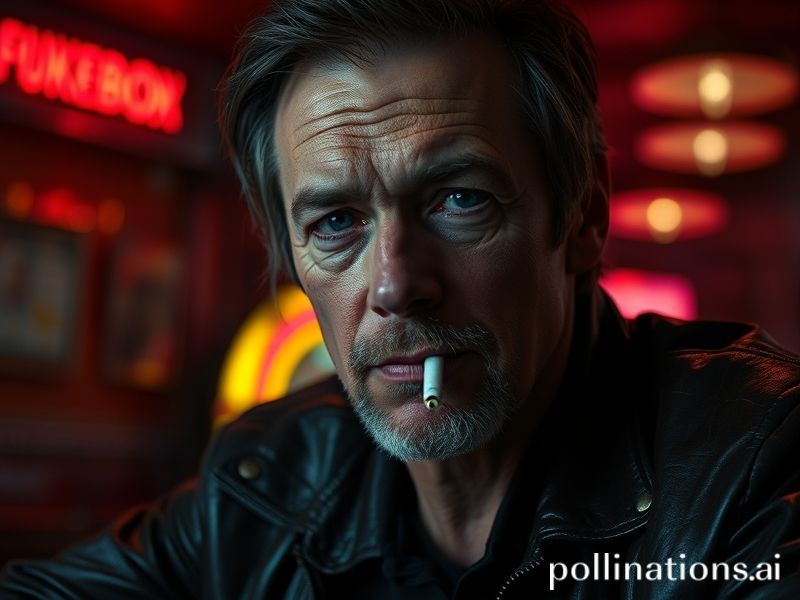Billy Bob Thornton: The World’s Favorite Broken American Delivers Global Menace on Demand
BILLY BOB THORNTON: AMERICA’S SOUTHERN-FRIED EXPORT OF MENACE, MISANTHROPY, AND MISPLACED ROMANCE
By the time you finish reading this sentence, Billy Bob Thornton will have been married in at least one additional time zone. The man who once wore Angelina Jolie’s blood in a vial around his neck has become, against all odds, the United States’ most reliable cultural emissary of beautifully broken masculinity—equal parts Delta blues, trailer-park Shakespeare, and bourbon-soaked geopolitical metaphor. From Lagos to Ljubljana, audiences recognize him as the walking embodiment of a superpower that can’t quite decide whether it wants to apologize or arm-wrestle.
International cinephiles first met Thornton in 1996, when Sling Blade rolled into Cannes like a slow-moving combine harvester of Southern Gothic dread. The French critics swooned; apparently, nothing says “auteur” quite like a man grunting “Mm-hmm” while wielding a lawn-mower blade. Overnight, European festivals discovered that American dysfunction—when filtered through Thornton’s slack-jawed charisma—was somehow more palatable than the home-grown variety. By the time he collected his Oscar, the statuette looked suspiciously like it had been whittled from a pecan tree.
Global box-office accountants took notes. Hollywood, ever the opportunist, realized that Billy Bob’s brand of laconic menace translated into ticket sales on every continent where people worry about their own fathers. Bad Santa turned Christmas into a transgressive art form from Toronto to Tokyo; Mr. Woodcock weaponized gym-class trauma into a universal language of resentment. Even in countries that don’t celebrate Thanksgiving, audiences understood the primal urge to punch a PE teacher in the face.
But Thornton’s real diplomatic coup came via television. Goliath, his Amazon legal noir, streams from Mumbai multiplexes to Milanese metro tablets, offering viewers the soothing reassurance that American justice is still purchasable—just slightly dented. Foreign policy analysts might call it soft power; cynics call it exporting the billable hour. Either way, every time Thornton rasps another closing argument, a European bureaucrat quietly updates his corruption index.
His personal life, meanwhile, operates like a satire of bilateral treaties. The man has more ex-spouses than most nations have trade partners, and each divorce settlement resembles a miniature NAFTA renegotiation: long, messy, and ultimately beneficial to the lawyers. Yet somehow the revolving door of matrimony hasn’t dented his credibility; if anything, it confirms the global suspicion that America can’t stick to any commitment longer than a TikTok trend.
Musically, Thornton’s band, The Boxmasters, tours like a rogue non-state actor. They’ve played Tel Aviv dive bars and Siberian rock festivals, peddling a twangy indictment of heartbreak that sounds suspiciously like foreign aid in reverse: instead of sending grain, we ship regret. Critics in Reykjavík call it “haunting”; locals in Reykjavík just call it Tuesday.
The broader significance? Thornton has become a Rorschach test for how the world sees America itself—weathered, unpredictable, occasionally brilliant, and always one bad decision away from a bar fight. When he appears on Scandinavian talk shows, hosts treat him like a rare carnivore: fascinating, slightly dangerous, and best observed from behind reinforced glass. Viewers nod along, recognizing the same volatile DNA that powers both Hollywood endings and drone strikes.
In an era when soft power is measured in streaming minutes and meme velocity, Billy Bob Thornton remains the rare export that needs no translation. His face—equal parts wounded coyote and repentant serial killer—speaks fluent human anxiety. Whether he’s crooning about heartbreak or litigating corporate malfeasance, the message is consistent: the American experiment is still running, but the check-engine light is on.
And so, as trade wars flare and climate summits collapse, rest assured that somewhere tonight, in a Berlin hostel or a Brisbane cine-club, a lone projector flickers to life and Billy Bob Thornton growls another line about the darkness in men’s souls. The audience leans in, comforted by the knowledge that across the ocean, someone else is just as screwed up as they are—only with better lighting and a marginally bigger budget.







